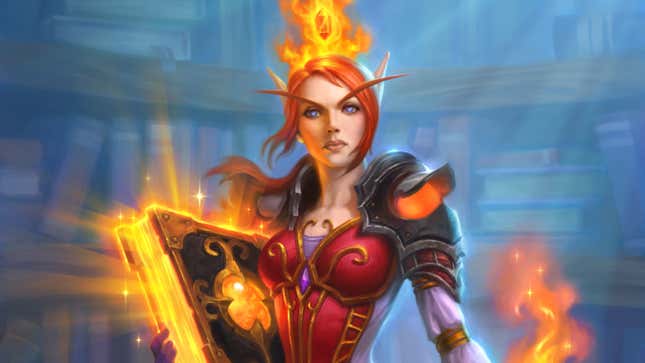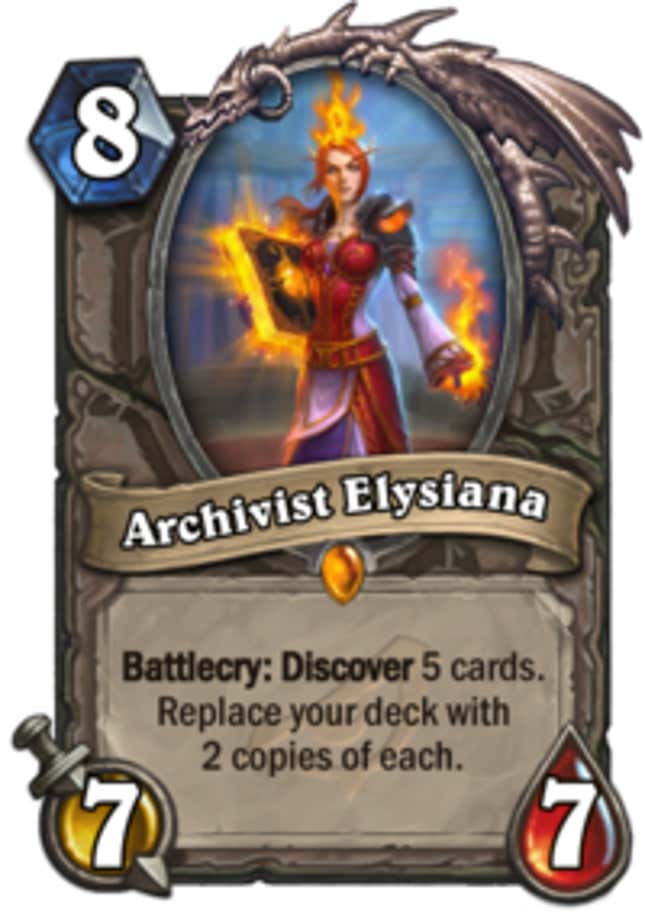
Up until the launch of this month’s “Rise of Shadows” expansion, Hearthstone was ruled by a few select cards that provide what fans call “infinite” value: Once you played them, you could benefit from their effects for the rest of the game. Deathstalker Rexxar, for example, provided infinite value by letting you add a powerful minion to your hand every turn after you played it. Rexxar is no longer playable in Hearthstone’s Standard ranked mode, and Blizzard has tried to get rid of infinite-value cards with this expansion. But a controversial card in the new set is making it apparent that rebalancing might not be so straightforward.

Hearthstone Card Of The Month
Every thirty days, we take a close look at a card that’s been getting a lot of buzz—good or bad—in the world of competitive Hearthstone.
You’ve probably seen Archivist Elysiana if you’ve played the game since the expansion released. When played, Elysiana lets you draft five random cards—similar to the drafting done in Hearthstone’s Arena mode—and once you’ve selected them, your entire deck is switched out with two copies of each card you’ve selected. If you have no cards left in your deck when you play Elysiana, the cards you draft become an extra 10 cards for you to draw. As an 8-Mana minion with 7 Attack and 7 Health, her base stats aren’t great (you’d usually want those 7s to be at least 8s at that cost). But her effect is often good enough to single-handedly win a matchup that goes into the high turn counts.

If you’ve ever played a game of Hearthstone where you went through all the cards in your deck, you’ll know why this effect is so helpful. Once your deck is exhausted, the next draw will give your character 1 point of “fatigue” damage. The second draw will deal 2 points of fatigue, the next deals 3, and so on. If you play Elysiana, you get to delay that damage by 10 turns.
But the card is great for other reasons, too. Some cards in Hearthstone, like Wrenchcalibur, Hakkar the Soulflayer, and Clockwork Goblin, shuffle cards into the opponent’s deck that deal damage when drawn. So if you’re playing against a Bomb Warrior deck whose main goal is to shuffle bombs into your deck, you might find it useful to get rid of those bombs in some way or another. Since Elysiana replaces your current deck with the cards you draft, she’s capable of replacing the bombs and countering one of the opponent’s main strategies.
All that being said: Even though Elysiana is a fun card to play, she’s not very fun to play against, mostly because she’s kind of a one-note late-game bomb. According to the Hearthstone stat-tracking site HSReplay, if you play Elysiana as a Warrior (the most popular way because it’s a good late-game class), you will win a game 62.5 percent of the time. This is a huge advantage when you consider that any deck with a win rate above 50 percent is considered “good.” On top of that, some people have taken to using “bounce” effects in their Elysiana decks, meaning that they use cards like Youthful Brewmaster or Seance to bring Elysiana back into their hands and allow them to add 10 more cards to their decks each time she’s played. It’s not exactly “infinite” value, but it can feel pretty damn close.
Once you’ve played 45 turns in a game of Hearthstone, neither player wins and the match ends in a draw. If you play Elysiana twice over the course of a game using bounce effects, you’re playing with a 50-card deck. A lot of late-game-focused matchups, then, come down to whether one player is running Elysiana in their deck, and after that, whether they’re running a bounce effect. This isn’t unfair from a deck-building standpoint, since it requires a sacrifice to opt for Elysiana and a bounce effect over more defensive card options, but it has a few potential negatives. First of all, since Hearthstone tournaments will soon be moving to a rule set called the “Specialist” format, where each player can bring three slightly different versions of a single deck from a single class, it creates a sort of arms race between late-game-oriented decks. In these slow battles of attrition, the person who wins is simply the person who plays Elysiana the most.
That brings us to the second problem: From a raw gameplay standpoint, losing to Archivist Elysiana—tournament or not—just feels bad. Nobody likes playing a 35-minute game of Hearthstone and walking away with a draw. Nobody likes getting slowly choked out while fatigue damage chips away at their health. Nobody likes watching the opponent play crappy Elysiana minions while maintaining a sizeable deck well into turn 40. Nobody likes losing to an opposing Elysiana that offered way better cards than theirs did. But hey, if you can’t beat ’em, join ’em. Or, as many seem to be doing, kill ’em before they can even play Elysiana by using an aggressive Rogue deck.